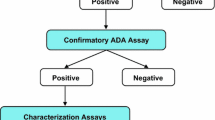Abstract
The unexpected and unpredictable development of unwanted immunogenicity is a significant issue affecting therapeutic proteins, including follow-on biologicals. The development of antibodies against the therapeutic biological can cause allergic or anaphylactic reactions, reduction in efficacy, and, in some cases, severe adverse effects. The risk of inducing immune responses is largely dependent on the recipient as well as a number of product-related factors (eg, production process, formulation, and number of doses administered during the course of treatment). Consideration should be given to the evaluation of unwanted immunogenicity of follow-on biologicals from preclinical development, through clinical trials, and into the postregistration period to minimize the risks associated with immunogenicity in recipients of therapeutic products. Properly planned immunogenicity studies during phase I/II clinical trials using a range of carefully validated procedures are needed to assess unwanted immunogenicity of therapeutic products.
Similar content being viewed by others
References
Porter S, Human immune response to recombinant human proteins. J Pharm Sci. 2001;90:1–11.
Koren E. Zuckerman LA Mire-Sluis AR. Immune responses to therapeutic proteins in humans— clinical significance, assessment and prediction. Curr Pharm Biotechnol. 2002;3:349–360.
Jacquemin MG, Saint-Remy JM. Factor VIII immunogenicity. Haemophilia. 1998:4:552–557.
Rosenberg M. Kingma W. Fitzpatrick MA, Richards SM, Immunosurveillance of alglucerase enzyme therapy for Gaucher patients: induction of humoral tolerance in seroconverted patients after repeat administration, Blood. 1999;93: 2081–2088.
Chance RE, Root MA, Galloway JA. The immunogenicity of insulin preparations. Acta Endocrinol. 1976;205(suppl):185–198.
Antonelli G, Currenti M, Turriziani O, Dianzani F, Neutralizing antibodies to interferon-α relative frequency in patients treated with different interferon preparations. J Inject Dis. 1991;163: 882–885.
Stein KE, Immunogenicity: concepts/issues/concerns. Dev Biol. 2002;109:15–23.
Baert F, Noman M, Vermiere S, et al. Influence of immunogenicity on the long-term efficacy of in fliximab in Crohn’s disease. N Engl J Med. 2003; 348:601–608.
Saint-Remy JM. Immunology of factor VIII inhibitors. Semin Thomb Hemost. 2002;28:265–268.
Steis R. Smith JW. Urba WJ. et al. Resistance to recombinant interferon α-2a in hairy-cell leukaemia associated with neutralizing anti-interferon antibodies. N Engl J Med. 1988;318: 1409–1413.
Francis GS, Rice GP, Alsop JC, PRISMS Study Group. Interferon ß-1a in MS: results following development of neutralizing antibodies in PRISMS, Neurology. 2005;65:48–55.
Hjelm Skog AL, Wadhwa M, Hassan M, et al. Alteration of IL-2 pharmacokinetics and function by IL-2 antibodies induced following treatment of colorectal carcinoma patients with a combination of monoclonal antibody 17-1A. GM-CSF and IL-2. Clin Can Res. 2001; 7:1163–1170.
Li J, Yang C, Xia Y, et al. Thrombocytopenia caused by the development of antibodies to thrombopoietin. Blood. 2001;98:3241–3248.
Casadevali N, Nataf J. Viron B. et al. Pure red cell aplasia and anti-erythropoietin antibodies against human erythropoietin in patients treated with recombinant erythropoietin. N Engl J Med. 2002;346:469–475.
Wadhwa M, Skog A-LH. Bird C, et al. Immunogenicity of granulocyte-macrophage colony stimulating factor (CM-CSF) products in patients undergoing combination therapy with GM-CSF. Clin Cancer Res. 1999;5:1353–1361.
Schellekens H. Biosimilar therapeutic agents: issues with bioequivalence and immunogenic. Eur J Clin Invest 2004;34:797–799.
European Medicines Evaluation Agency. EMEA Guideline on Similar Biological Medicinal Products Containing Biotechnology-Derived Proteins as Active Substance—Non-clinical and Clinical Issues. EMEA/ CHMP/BMWP/42832/2005.
De Groot AS, Rayner J, Martin W. Modelling the immunogenicity of therapeutic proteins using T cell epitope mapping, Dev Biol. 2003; 112:71–80.
Chirino AJ, Ary M, Marshall SA, Minimizing the immunogenicity of protein therapeutics. Drug Discovery Today. 2004;9:82–90.
Stickler M, Rochanayon N, Razo OJ. et al. An in vitro human cell-based assay to rank the relative immunogenicity of proteins. Toxicol Sci. 2004; 77:280–289.
Bussiere JL. Animal models as indicators of immunogenicity of therapeutic proteins in humans. DevBiol. 2003;112:135–139.
Braun A, Kwee L, Labow MA, Alsenz J, Protein aggregates seem to play a key role among the parameters influencing the antigenicity of interferon α (IFN-α) in normal and transgenic mice, Pharm Res. 1997;14:1472–1478.
Zwickl CM, Cocke KS, Tamura RN, et al. Comparison of the immunogenicity of recombinant and pituitary human growth hormone in rhesus monkeys. Fundam Appl Toxicol. 1991;16:275–287.
Hermeling S, Jiskoot W, Crommelin D, Bornaes C, Schellekens H, Development of a transgenic mouse model immune tolerant for human interferon ß. Pharm Res. 2005;22:847–851.
Wadhwa M, Bird C, Dilger P, Gaines-Das R, Thorpe R, Strategies for detection, measurement and characterization of unwanted antibodies induced by therapeutic biologicals. J Immunol Methods. 2003;278:1–17.
Mire-Sluis AR, Barrett YC, Devanarayan V, et al. Recommendations for the design and optimization of immunoassays used in the detection of host antibodies against biotechnology products. J Immunal Methods. 2004;289:1–16.
Author information
Authors and Affiliations
Corresponding author
Additional information
The Drug Information Association is accredited by the Accreditation Council for Pharmacy Education as a provider of continuing pharmacy education. This program is designated for a maximum of I contact hour or . I continuing education units (CEUs). 286-000-07-40-H1 04.
If you would like lo receive a statement ofcredit. you must review the article. answer the questions to the posttest on fhe Post-test and Evaluation Form and submit it lo the DIA. Participants must receive a passing score of 80% or better on the post-test in order to receive a statement ofcredit. Statements ofcredit will be mailed within one month of receipt ofthe Post-test and Evaluation Form. There is no fee to receiveyour statement of credit.
Rights and permissions
About this article
Cite this article
Wadhwa, M., Thorpe, R. Unwanted Immunogenicity: Implications for Follow-on Biologicals. Ther Innov Regul Sci 41, 1–9 (2007). https://doi.org/10.1177/009286150704100102
Published:
Issue Date:
DOI: https://doi.org/10.1177/009286150704100102



